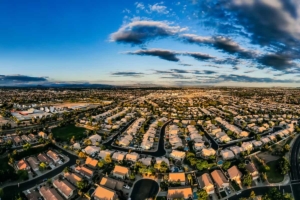City of Casa Grande
The Arizona Department of Transportation (ADOT) continues with its ongoing study of the proposed Interstate 11. The primary aim of the study was to propose and plan a high-priority link between Phoenix and Las Vegas, but ADOT recently indicated that the I-11 planners are considering extending the range of the interstate from Mexico to Canada. This extended transportation corridor could enhance commerce, international trade, tourism and create a border-to-border manufacturing corridor. The southern segment of the corridor would link Nogales with Tucson, then Phoenix, and, potentially, be routed through Casa Grande. This could put Casa Grande in the center of a significant commerce, manufacturing and tourist corridor, linking it to vast numbers of communities to the south and north. Currently, there is just the study, which is very important in the initiation of the planning process. That would include additional studies, such as environmental, engineering and routing studies. Funding is not yet available for the project, which will cost billions of dollars, and could be years if not decades away.
City of Coolidge
Recently, the Coolidge City Council approved changes to its general plan that would allow for the future economic development and planning of approximately 11,500 acres of land that is mostly owned by Pinal Land Holdings (PLH) and has been known for many years as the “Mesa Water Farm Property.” The City of Mesa purchased the property for future preservation of its water rights but sold much of the land to PLH this past year. PLH is now in the process of rezoning the property for various uses. Coolidge leaders have expressed excitement about the potential for growth and development of this property resulting from the general plan changes and are proposing to annex the area by the end of the year.
City of Phoenix
The Phoenix City Council recently gave tentative approval to the city’s proposed impact fee structure for 2015. Impact fees are developer-paid fees used by the city to deliver services to new development. They are used by the city to pay for development improvements such as streets, drainage infrastructure, water and sewer facilities, and to fund fire and police, library and park facilities. The new fees are proposed to be increased by approximately 4.6 percent to 43.1 percent, depending on which impact fee zone is addressed. The northwest impact fee zone has the highest current fees but is proposed for the lowest increase of 4.6 percent, while the Ahwatukee zone has the lowest current fees but is proposed for the highest increase of 43.1 percent. The new fee proposal is available for public review and comment before final action is taken.
City of Tempe
Charged by the Tempe City Council with finding ways to improve the development and home improvement process, Tempe’s public works, engineering and community development staff have reorganized to improve service. Most questions about residential or business projects on private property and parcels of land may now be answered at the community development front counter. Issues involving city right-of-way on major arterials, capital improvement projects and bid openings will be addressed through public works or engineering. Community development front counter staff can assist residents with permitting (except utility permits for utility companies), property information, plats, underground utility information, right-of-way and haul permits, floodplain information, address assignments and inquiries. From residents who want to add a pool or garage to contractors, land use attorneys and developers, these changes will streamline processes. After months of meetings and planning, the drafts for Tempe’s first character area plans are ready for review and comments. Hundreds of Tempe residents have participated in a series of public meetings and surveys to come up with the elements that define their character areas as well as the desired conditions that they would like to see embraced in the future. Character areas recognize groups of neighborhoods that contain common design, land use and commercial characteristics distinct from neighboring areas. Similarities in age of housing, styles of architecture, patterns of development, land use or street patterns and landscaping form some of the recognizable differences. Meetings to review the drafts for character areas 7, Corona/South Tempe, and 8, Kiwanis/The Lakes, have already taken place. However, each section of the city will have an opportunity to participate in the character area process for their neighborhood at future meetings.
City of Scottsdale
Scottsdale is preparing a zoning ordinance text amendment to the service residential district of the zoning ordinance. This effort will include revisions to all sections of the district, including, but not limited to, a purpose statement, use provisions and development standards. The proposal may include revisions to definitions, conditional-use criteria and administrative requirements, general provisions, signs, parking and landscaping. As part of a citywide outreach on this proposal, the community is invited for review and comment.



